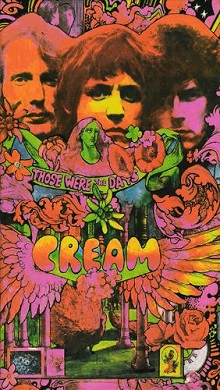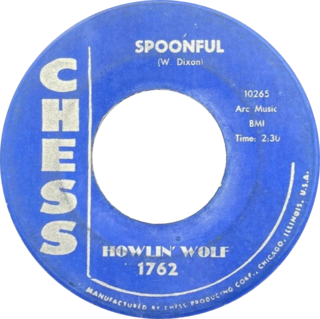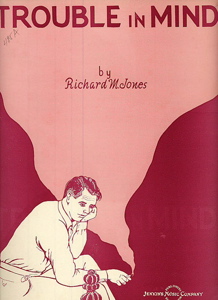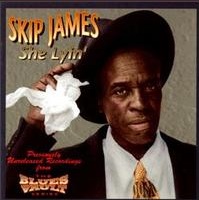
Blues is a music genre and musical form that originated in the Deep South of the United States around the 1860s. Blues incorporated spirituals, work songs, field hollers, shouts, chants, and rhymed simple narrative ballads from the African-American culture. The blues form is ubiquitous in jazz, rhythm and blues, and rock and roll, and is characterized by the call-and-response pattern, the blues scale, and specific chord progressions, of which the twelve-bar blues is the most common. Blue notes, usually thirds, fifths or sevenths flattened in pitch, are also an essential part of the sound. Blues shuffles or walking bass reinforce the trance-like rhythm and form a repetitive effect known as the groove.

Nehemiah Curtis "Skip" James was an American Delta blues singer, guitarist, pianist and songwriter. With his ghostly, plaintive falsetto and mastery of open tunings, James devised one of the most singular sounds in blues history, leaving behind a body of work that has influenced everyone from Canned Heat to practitioners of American primitive guitar.

Shades of Deep Purple is the debut album by the English rock band Deep Purple, released in July 1968 on Tetragrammaton in the United States and in September 1968 on Parlophone in the United Kingdom. The band, initially called Roundabout, was the idea of former Searchers drummer Chris Curtis, who recruited Jon Lord and Ritchie Blackmore before leaving the project. The Mk. I line-up of the band was completed by vocalist/frontman Rod Evans, along with bassist Nick Simper and drummer Ian Paice, in March 1968.

"Mannish Boy" is a blues standard written by Muddy Waters, Mel London, and Bo Diddley. First recorded in 1955 by Waters, it serves as an "answer song" to Bo Diddley's "I'm a Man", which was in turn inspired by Waters' and Willie Dixon's "Hoochie Coochie Man". "Mannish Boy" features a repeating stop-time figure on one chord throughout the song.
"Poor Boy Blues", or "Poor Boy, Long Ways From Home", is a traditional blues song that has been cited as one of the oldest in the genre. As with most traditional blues songs, there is great variation in the melody and lyrical content as performed by different artists. However, there is often a core verse containing some variation of the line "I'm a poor boy a long way from home."

Those Were the Days is a retrospective compilation of music recorded by the British rock band Cream, released on 23 September 1997. It comprises four compact discs and includes almost every studio track released during the band's active lifetime, with the exception of the original "Passing The Time" from Wheels of Fire, and all but three tracks from the live material recorded in 1968 and released on Wheels of Fire, Goodbye, and the two Live Cream volumes of 1970 and 1972. The title is taken from the song written by Ginger Baker and Mike Taylor, released on Wheels of Fire in 1968.

"Spoonful" is a blues song written by Willie Dixon and first recorded in 1960 by Howlin' Wolf. Called "a stark and haunting work", it is one of Dixon's best known and most interpreted songs. Etta James and Harvey Fuqua had a pop and R&B record chart hit with their duet cover of "Spoonful" in 1961, and it was popularized in the late 1960s by the British rock group Cream.

"Killing Floor" is a 1964 song by American blues singer-songwriter and guitarist Howlin' Wolf. Called "one of the defining classics of Chicago electric blues", "Killing Floor" became a blues standard with recordings by various artists. It has been acknowledged by the Blues Foundation Hall of Fame, which noted its popularity among rock as well as blues musicians. English rock group Led Zeppelin adapted the song for their "The Lemon Song", for which Howlin' Wolf is named as a co-author.

"Rollin' and Tumblin'" is a blues standard first recorded by American singer-guitarist Hambone Willie Newbern in 1929. Called a "great Delta blues classic", it has been interpreted by hundreds of Delta and Chicago blues artists, including well-known recordings by Muddy Waters. Rock musicians usually follow Waters' versions, with the 1960s group Cream's rendition being perhaps the best known.
Donald Theodore Kent was an American collector of blues and bluegrass recordings, a founder and owner of record labels, and a much sought-after writer of liner notes not only on his own labels' issues but also on others', such as Yazoo Records. Many of the blues reissue albums of the 1960s and 1970s use 78-rpm records from his large collection.

"Sitting on Top of the World" is a country blues song written by Walter Vinson and Lonnie Chatmon. They were core members of the Mississippi Sheiks, who first recorded it in 1930. Vinson claimed to have composed the song one morning after playing at a white dance in Greenwood, Mississippi. It became a popular crossover hit, and was inducted into the Grammy Hall of Fame in 2008.

"Trouble in Mind" is a vaudeville blues-style song written by jazz pianist Richard M. Jones. Singer Thelma La Vizzo with Jones on piano first recorded it in 1924 and in 1926, Bertha "Chippie" Hill popularized the tune with her recording with Jones and trumpeter Louis Armstrong. The song became an early blues standard, with numerous renditions by a variety of musicians in a variety of styles.
"Crawling King Snake" is a blues song that has been recorded by numerous blues and other artists. It is believed to have originated as a Delta blues in the 1920s and be related to earlier songs, such as "Black Snake Blues" by Victoria Spivey and "Black Snake Moan" by Blind Lemon Jefferson.

"Forty-Four" or "44 Blues" is a blues standard whose origins have been traced back to early 1920s Louisiana. However, it was Roosevelt Sykes, who provided the lyrics and first recorded it in 1929, that helped popularize the song. "Forty-Four," through numerous adaptations and recordings, remains in the blues lexicon eighty years later.

"Baby What You Want Me to Do" is a blues song that was written and recorded by Jimmy Reed in 1959. It was a record chart hit for Reed and, as with several of his songs, it has appeal across popular music genres, with numerous recordings by a variety of musical artists.

"Crosscut Saw", or "Cross Cut Saw Blues" as it was first called, is a hokum-style song "that must have belonged to the general repertoire of the Delta blues". Mississippi bluesman Tommy McClennan's recording of the song was released in 1941 and has since been interpreted by many blues artists. "Crosscut Saw" became an early R&B chart hit for Albert King, "who made it one of the necessary pieces of modern blues".

"You Don't Love Me" is a rhythm and blues-influenced blues song recorded by American musician Willie Cobbs in 1960. Adapted from Bo Diddley's 1955 song "She's Fine She's Mine", it is Cobbs' best-known song and features a guitar figure and melody that has appealed to musicians in several genres.
"Checkin' Up on My Baby" is a song recorded by Sonny Boy Williamson II in 1960 that has become a classic of the blues. The song was not released as a single, but was included on Williamson's The Real Folk Blues album released after his death in 1965. The song has been recorded by numerous blues and other artists, making it one of Williamson's most recorded songs.

She Lyin' is the second studio album by American blues singer Skip James, recorded in 1964 and released in 1993. It was originally recorded for Takoma Records and was James' first recording since his rediscovery in 1964.















